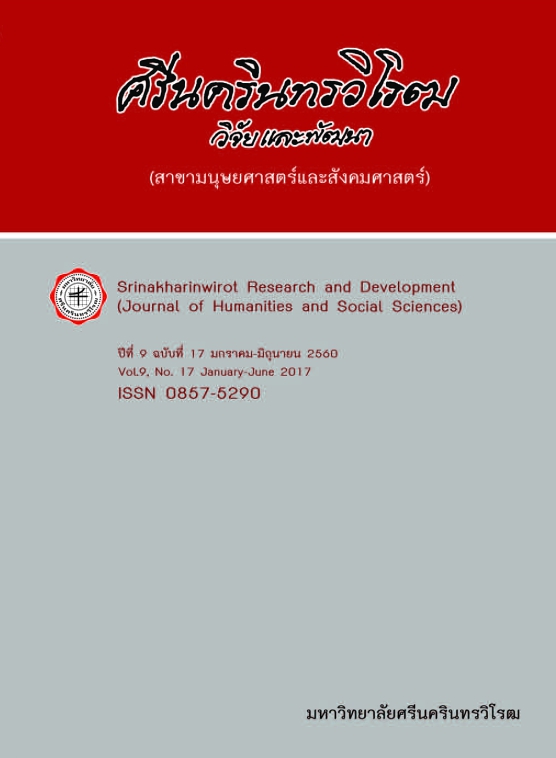บทบาทของผู้สูงอายุต่อความเจริญเติบโตทางเศรษฐกิจในประเทศไทย THE ROLE OF POPULATION AGING ON ECONOMIC GROWTH IN THAILAND
Keywords:
Demographic Changes, Aging Society, Human Capital, Economic GrowthAbstract
บทคัดย่อ
โครงสร้างประชากรไทยมีการเปลี่ยนแปลงประชากรวัยเด็กและวัยแรงงานมีแนวโน้มที่ลดลงเนื่องจากการลดลงของภาวะเจริญพันธุ์ ขณะที่ประชากรผู้สูงอายุมีอายุยืนขึ้นเนื่องมาจากพัฒนาการทางการแพทย์และสาธารณสุข เกิดความไม่สมดุลระหว่างประชากรผู้สูงอายุและกำลังแรงงาน อย่างไรก็ดี จำนวนผู้สูงอายุที่เพิ่มขึ้นนั้นอาจไม่ใช่ปัญหาต่อระบบเศรษฐกิจ หากได้รับการส่งเสริมและสนับสนุนอย่างเหมาะสม การศึกษานี้มีวัตถุประสงค์เพื่อวิเคราะห์บทบาทของผู้สูงอายุต่อความเจริญเติบโตทางด้านเศรษฐกิจ ด้วยวิธีการทบทวนเอกสาร บทความงานวิจัยและงานวิชาการที่เกี่ยวข้อง ผลการศึกษาพบว่า หากรัฐมีนโยบายการจัดการสังคมผู้สูงอายุทั้งในมิติเศรษฐกิจและสังคม ครอบคลุมนโยบายแรงงาน การศึกษา สาธารณสุขและสวัสดิการสังคม รัฐสนับสนุนและส่งเสริมการลงทุนในทุนมนุษย์ ทั้งการศึกษา การอบรม การวิจัย อันนำไปสู่การเรียนรู้ตลอดชีวิตทำให้ผู้สูงอายุมีความรู้มีทักษะ ขยายอายุเกษียณเพื่อให้ผู้สูงอายุพึ่งพาตนเองได้มากขึ้น การดูแลรักษาสุขภาพอย่างต่อเนื่องทำให้ผู้สูงอายุ มีสุขภาวะที่ดี ไม่เป็นปัญหาต่อครอบครัวและสังคม มอบโอกาสให้ผู้สูงอายุมีส่วนร่วมในระดับชุมชนและท้องถิ่น ตลอดจนสร้างความรู้ความเข้าใจและวางแผนเตรียมการออมเงินตั้งแต่ในวัยทำงานเพื่อใช้จ่ายใน
วัยเกษียณ การดำเนินการดังกล่าวทำให้สามารถบริหารจัดการสังคมผู้สูงอายุได้อย่างยั่งยืน และเป็นการสร้างบทบาทของผู้สูงอายุต่อความเจริญเติบโตทางเศรษฐกิจผ่านการลงทุนในทุนมนุษย์
Abstract
Thailand's demographic changed, child and labor force are declining due to a decrease in total fertility rate. The development of medical and public health leads to population aging has longevity. This situations cause unbalance between population aging and labor force. However, it is not an economic and social problem so this study want to analyze the role of population aging on economic growth by document research and scholarly work related. The study finds that if the government has an appropriate policy to manage an aging society, both in economic and social dimensions. The government policies should cover labor, education, health and social welfare policies. Especially, the government support and promote investment in human capital, i.e., education, training and research that lead to life-long learning skills, knowledge and skill of the elderly. Extending the retirement age to population aging has more self-reliance. Continuing health care can make good health not to be a burden for the family and society. Providing opportunities for seniors to participate in local and community level. Along with creating has a better understanding and planning of the working-age savings to spend in retirement period. Such the policies lead to the management of an aging society in a sustainable manner as well as create the role of population aging on economic growth through investment in human capital.
Downloads
Downloads
Published
How to Cite
Issue
Section
License
Srinakharinwirot Research and Development Journal of Humanities and Social Sciences is licensed Under a Creative Commons Attribution-NonCommercial-NoDerivs 4.0 International (CC-BY-NC-ND 4.0) License, Unless Otherwise Stated. Please Read Journal Policies Page for More Information on Open Access, Copyright and Permissions.


